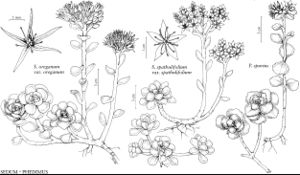Phedimus
Amer. Monthly Mag. & Crit. Rev. 1: 438. 1817,.
Herbs, perennial, not viviparous, 0.5–5 dm, (often woody at base), glabrous [pubescent]. Stems erect or creeping, simple or branched, fleshy. Leaves persistent, cauline, alternate or opposite, (± alike), sessile [petiolate], (narrowed to base), not connate basally; blade orbiculate, obovate, spatulate-elliptic, or elliptic-lanceolate, laminar, 1–8 cm, fleshy, base not spurred, margins crenate (sometimes glandular); veins not conspicuous. Inflorescences terminal cymes. Pedicels absent. Flowers erect, 5-merous; sepals connate basally, all alike or unequal; petals spreading, erect basally and spreading distally or recurved at tip, nearly distinct, yellow, white, or pink; calyx and corolla not circumscissile at base in fruit; nectaries adnate to pistils as basal scales; stamens 10; filaments of antipetalous stamens adnate to corolla; pistils erect, nearly distinct; ovary base truncate; styles shorter than ovary. Fruits stellately spreading. Seeds ellipsoid, finely lined.
Distribution
Introduced; Europe, Asia.
Discussion
Aizopsis Grulich; Asterosedum Grulich; Spathulata (Borissova) Á. Löve & D. Löve
Species 20 (3 in the flora).
S. Mayuzumi and H. Ohba (2004) concluded that Phedimus forms a lineage distinct from Sedum in a strongly supported clade based on chloroplast and nuclear DNA sequences. Phedimus is characterized by having flattened leaves with serrate or crenate margins; Sedum has semiterete or very thickened leaves with entire margins (Ohba et al. 2000).
Selected References
None.
Lower Taxa
Key
| 1 | Leaves opposite; petals white to pink. | Phedimus spurius |
| 1 | Leaves alternate; petals yellow | > 2 |
| 2 | Leaf blades elliptic-lanceolate, 4-8 cm. | Phedimus aizoon |
| 2 | Leaf blades spatulate-elliptic to obovate, 1.5-3 cm. | Phedimus hybridus |
